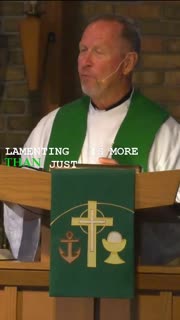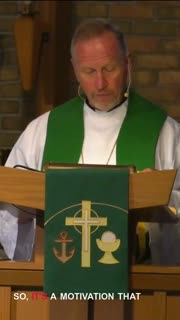Embracing Lament: Honest Prayer in Suffering
Devotional
Sermon Summary
Bible Study Guide
Sermon Clips
### Quotes for Outreach
1. "Culture tells us all our problems are solvable, aren't they? If I just as a human can figure it out, maybe there's something wrong with me. Maybe I just need to go into a state of depression versus share my heart with God. Grace and peace to you today from God our Father and the Lord and Savior Jesus Christ. Amen." [00:00] (17 seconds)
2. "God invites us to be that honest in our prayer life with Him. And the thing, I guess, to keep in mind as we go through this little discussion of the language of lament is that God, you know, can read our hearts. So if we're thinking it, He can perceive it. Whether or not we try to hide it by what we say in a very respectful manner." [01:44] (21 seconds)
3. "The language of lament is not an outburst of unrestrained speech that gives free rein to an emotional torrent of words. It's not meant to be that. It's not a venting for the sake simply of venting to God. Instead, it's a structured, controlled language in a modicum of structure in times where we feel really disoriented in our lives or in our struggles." [04:28] (22 seconds)
4. "The faithful love of God never ends. God is steadfast in His love. And that's the key point when it is bookended by a lot of complaining at the beginning and then a lot of focus on why am I motivated? Because you've delivered me." [06:26] (15 seconds)
5. "So hesed is this steadfast love. It's used 248 times in Scripture. Hesed. God's steadfast love. His loving kindness. His covenant loyalty. Because it's a covenant. And Israel broke the covenant. You will follow my ten commandments. You will not commit adultery. You will not commit idolatry. All of the commandments, as we know them, of which we constantly sin. But they abused him to a very severe degree. And they faced his punishment. But they also faced his continued steadfast love." [08:05] (35 seconds)
### Quotes for Members
1. "Lamenting is more than just whining. It's more than that. It's an appeal to God of the genuineness of our heart. And it actually is a place to have sort of a space for our grief. And to be very honest with our grief to God. At a visitation not that long ago, the individual I was speaking with that we communed, said, I don't get why God has been so rough on me this year. It's like, is God hating me? I don't understand it. That is a lament. And in a prayer, it's sometimes very hard to say those words. That that's how you feel. But it's really trying to bring this out in the open." [03:04] (45 seconds)
2. "One is the three parts that are really components of lamenting is to be brutally honest with where you're at in your life. And with your struggles. And with how you perceive God to be responding or not to your particular problems. And you're reaching out with a point of motivation that is looking for help. So it wants to be help. You want helpfulness from God either to you or to the community. Because we can lament as a community. And many of the Psalms are individual laments but also there's a good portion that are community laments. Where we lament as a congregation. As a church body. For where things are at maybe in our society." [09:03] (39 seconds)
3. "So, it's a motivation that you have inherent when you go through a lamentation, the language of lamenting, which says, I know why, God, you should act, because I have confidence in you to act. It's this confidence that bears out in the word hope. Hope because of what God did for us through His Son in His own suffering. So, like, the rituals that we have in a wedding, the rituals that we have in the liturgical flow of our service, the rituals that we have in a funeral, so we have sort of a ritual format for how we lament to God." [05:06] (32 seconds)
4. "So when you structure it you begin by of course you address it to God. As we do in any prayer to our Heavenly Father. And then you state your concern. Oh God, you've been a person apparently absent in my life. I mean I'm going through these struggles. I don't even feel your presence. Are you going to help me or not? Is it going to be in my lifetime or another? When are you going to make a difference in my life? And then you state your motivation. Because Lord I know you have acted with your people. I know you take care of suffering. I know you heal all wounds. I know you did it through your son. But I know you will do it in my life. Or at least in your plan. There is a blessing forthcoming. And then you end with praise. Because Lord you are the God of all creation. You are the God who gave your son. You are the God of everything. Your steadfast love endures forever. Praise to you Father, Son, and Holy Spirit." [10:09] (52 seconds)
5. "So don't break that covenant. Share your lament and your concerns with God. If you're in a great state of depression, of course seek secular help. But seek help from God. Share it directly with Him. Don't ponder in silence by yourself. Ponder in spiritual alignment with your Heavenly Father. Seek His counsel. Seek His direction. Because He is faithful." [16:30] (24 seconds)
Ask a question about this sermon
1. "Culture tells us all our problems are solvable, aren't they? If I just as a human can figure it out, maybe there's something wrong with me. Maybe I just need to go into a state of depression versus share my heart with God. Grace and peace to you today from God our Father and the Lord and Savior Jesus Christ. Amen." [00:00] (17 seconds)
2. "God invites us to be that honest in our prayer life with Him. And the thing, I guess, to keep in mind as we go through this little discussion of the language of lament is that God, you know, can read our hearts. So if we're thinking it, He can perceive it. Whether or not we try to hide it by what we say in a very respectful manner." [01:44] (21 seconds)
3. "The language of lament is not an outburst of unrestrained speech that gives free rein to an emotional torrent of words. It's not meant to be that. It's not a venting for the sake simply of venting to God. Instead, it's a structured, controlled language in a modicum of structure in times where we feel really disoriented in our lives or in our struggles." [04:28] (22 seconds)
4. "The faithful love of God never ends. God is steadfast in His love. And that's the key point when it is bookended by a lot of complaining at the beginning and then a lot of focus on why am I motivated? Because you've delivered me." [06:26] (15 seconds)
5. "So hesed is this steadfast love. It's used 248 times in Scripture. Hesed. God's steadfast love. His loving kindness. His covenant loyalty. Because it's a covenant. And Israel broke the covenant. You will follow my ten commandments. You will not commit adultery. You will not commit idolatry. All of the commandments, as we know them, of which we constantly sin. But they abused him to a very severe degree. And they faced his punishment. But they also faced his continued steadfast love." [08:05] (35 seconds)
### Quotes for Members
1. "Lamenting is more than just whining. It's more than that. It's an appeal to God of the genuineness of our heart. And it actually is a place to have sort of a space for our grief. And to be very honest with our grief to God. At a visitation not that long ago, the individual I was speaking with that we communed, said, I don't get why God has been so rough on me this year. It's like, is God hating me? I don't understand it. That is a lament. And in a prayer, it's sometimes very hard to say those words. That that's how you feel. But it's really trying to bring this out in the open." [03:04] (45 seconds)
2. "One is the three parts that are really components of lamenting is to be brutally honest with where you're at in your life. And with your struggles. And with how you perceive God to be responding or not to your particular problems. And you're reaching out with a point of motivation that is looking for help. So it wants to be help. You want helpfulness from God either to you or to the community. Because we can lament as a community. And many of the Psalms are individual laments but also there's a good portion that are community laments. Where we lament as a congregation. As a church body. For where things are at maybe in our society." [09:03] (39 seconds)
3. "So, it's a motivation that you have inherent when you go through a lamentation, the language of lamenting, which says, I know why, God, you should act, because I have confidence in you to act. It's this confidence that bears out in the word hope. Hope because of what God did for us through His Son in His own suffering. So, like, the rituals that we have in a wedding, the rituals that we have in the liturgical flow of our service, the rituals that we have in a funeral, so we have sort of a ritual format for how we lament to God." [05:06] (32 seconds)
4. "So when you structure it you begin by of course you address it to God. As we do in any prayer to our Heavenly Father. And then you state your concern. Oh God, you've been a person apparently absent in my life. I mean I'm going through these struggles. I don't even feel your presence. Are you going to help me or not? Is it going to be in my lifetime or another? When are you going to make a difference in my life? And then you state your motivation. Because Lord I know you have acted with your people. I know you take care of suffering. I know you heal all wounds. I know you did it through your son. But I know you will do it in my life. Or at least in your plan. There is a blessing forthcoming. And then you end with praise. Because Lord you are the God of all creation. You are the God who gave your son. You are the God of everything. Your steadfast love endures forever. Praise to you Father, Son, and Holy Spirit." [10:09] (52 seconds)
5. "So don't break that covenant. Share your lament and your concerns with God. If you're in a great state of depression, of course seek secular help. But seek help from God. Share it directly with Him. Don't ponder in silence by yourself. Ponder in spiritual alignment with your Heavenly Father. Seek His counsel. Seek His direction. Because He is faithful." [16:30] (24 seconds)










